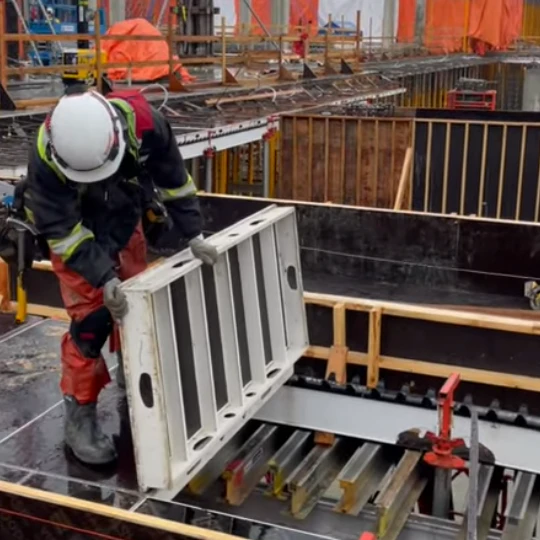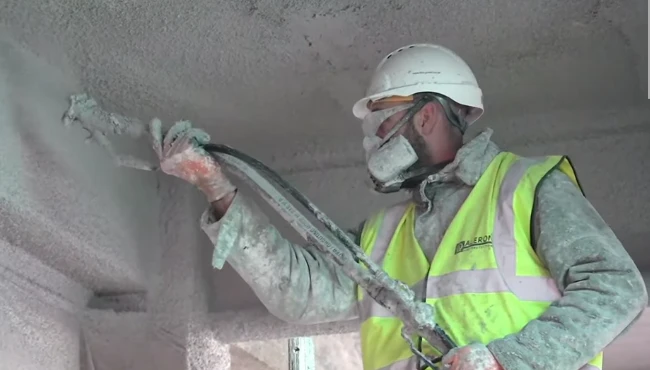What does a formworker do?
In the dynamic world of construction, formworkers, often referred to as concrete carpenters, play a crucial role in shaping the foundation of structures. These skilled professionals are responsible for creating the forms into which the concrete is poured to give it the desired shape and structure and to ensure the solidity and integrity of the final product. Their job covers a whole spectrum of tasks, from setting up molds to pouring and finishing concrete surfaces. They meticulously adhere to plans and specifications and ensure precise measurements and alignments. In addition, they work closely with structural steel fixers, which reinforces the concrete with steel, forming a symbiotic relationship that is critical to the stability and integrity of the structure.
Required skills
Becoming a formworker requires a number of specialized skills. Key skills include experience in carpentry, an understanding of construction drawings and the ability to work with precision tools. Attention to detail, measurement accuracy and a keen eye for design are essential, as is the ability to work seamlessly with other construction professionals.

Qualifications
Achieving an NVQ Level 2 or NVQ Level 3 in Formwork is a significant advantage for formworkers. Holding a blue CSCS or gold CSCS card enhances employability and demonstrates a commitment to safety and quality work. For structural steelworkers, there is the NVQ level 2 in Steelfixing Occupations (Construction)
Benefits
There are a number of benefits to being a formwork fitter. It is very satisfying to see a project develop from plans to concrete reality. The demand for skilled formworkers ensures a steady influx of employment opportunities and therefore job security. In addition, the versatility of the projects keeps the work interesting and constantly challenges the skills of the formworkers.
Challenges
While the work of a formworker is rewarding, it also comes with challenges. Unfavourable weather conditions, tight deadlines and the physically demanding work can be daunting. However, overcoming these challenges contributes to the resilience and adaptability that characterize a successful formworker.
Career path and progression
The career path for a formworker is anything but stagnant. Starting as apprentices, individuals can advance to become skilled craftsmen. With experience, they may take on supervisory roles or specialize in niche areas such as architectural concrete. The continuous evolution of skills is vital for staying relevant in the ever-changing construction industry.
Statistics
Formworkers in the UK* – Prognosis
Average Annual Increase
ARR**
SOURCE: CITB ” Labour Market Intelligence Report (2024 – 2028)”.
* These prognosis calculations assume constant ARR and growth rate without significant external disruptions.
** ARR – Annual Recruitment Requirement is a metric used to estimate the number of new workers needed annually to meet labour market demands in a specific industry, region, or occupation.
How much could you earn as a formworker
Formwork carpenters in the UK earn varying wages based on experience and employment status. Entry-level employed workers earn around £20 per hour (£39,000 annually), while experienced ones can earn up to £22.50 per hour (£43,875 annually). Self-employed individuals charge approximately £25 per hour, with daily earnings ranging from £200 to £280, depending on experience and location.
*Information sourced from reputable recruitment sites and agencies, reflecting the latest job market insights and trends. Figures can vary based on factors such as specific job requirements, individual qualifications, and regional economic conditions. Additionally, self-employed professionals should account for expenses such as tools, materials, insurance, and transportation when calculating their net earnings.
Typical hours per week
Standard work hours per week
(Employed)
Working hours per week with overtime
(Employed and Self-employed)
Formworkers usually work full-time, averaging around 43 hours per week. However, overtime may be required due to project deadlines, which contributes to higher earnings.
Conclusion
The role of a formworker is both challenging and rewarding, offering a dynamic career path within the construction industry. For those with a passion for precision and a love for hands-on craftsmanship, this profession holds the key to building a solid foundation for the future.

